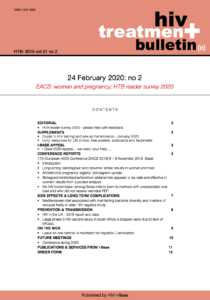HTB February 2020 online
24 February 2020. Related: News.

This edition of HTB includes our last reports from the EACS conference last year relating to women’s health and use of ART during pregnancy.
It is reassuring that there is no signal that long acting cabotegravir and rilpivirine injections act any differently in women compared to results overall.
There are updated results for the association between dolutegravir and the risk of neural tube defects in conception and pregnancy – and the first tentative data looking at this risk with bictegravir, a very similar molecule.
Also, although the numbers are small, a report from Switzerland where discontinuing use of neonatal PEP has been recommended since 2016 for babies from mothers who have an undetectable viral load during the third trimester of pregnancy. This is the first high-income country to try this.
It is disappointing to report the early closure of another phase 3 HIV vaccine study due to lack of effect (adding pressure on other existing studies to be more promising).
Also, although not in HIV positive participants, an interesting study of older people using the Mediterranean diet, reported anti-inflammatory effects that might be relevant to HIV positive people (and where there is no evidence of harm).
Next month, travel permitted, we will bring news from CROI 2020 which is being held in Boston from 8 to 11 March.
And while reading time this issue month might be shorter, it would really help i-Base if readers could help with feedback using this short online survey.
